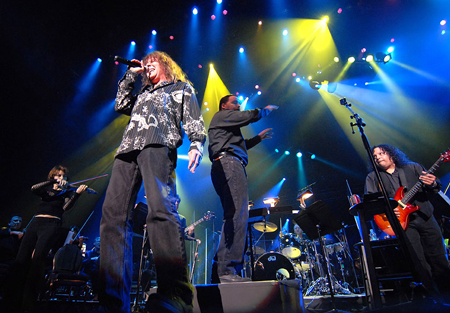by Robert Rollin

Formed in 1968 in the wake of the British group The Yardbirds, Led Zeppelin included composer-guitarist Jimmy Page, lyricist-guitarist Robert Plant, composer-bassist and keyboardist John Paul Jones, and drummer John Bonham. They pioneered the huge stadium appearances that later became frequent among heavy metal groups. The dominant rock group of the 1970s, they sold between 200 and 300 million recordings and gained a prominence comparable to that of The Beatles in the 1960s. They derived their style from the blues music of such artists as Muddy Waters, Skip James, and Howlin’ Wolf, as well as British, Celtic, and American folk music.
Windborne’s lead singer Randy Jackson even looks like Robert Plant. His high-range vocal stylings, even shriller than Plant’s, seemed to reflect the heavy metal rock groups that were heirs to Led Zeppelin’s innovations. Whether shrieking out hard rock vocalizations or playing his acoustic guitar and singing quietly, he showed wonderful talent and veneration for Plant’s original contributions.
Lead guitarist George Cintron was terrific, drawing a wide range of electric guitar sounds and riffs. Electric bassist Dan Clemens was excellent, especially in the repeated patterns that underpin many of the faster Led Zeppelin songs. Drummer Powell Randolf showed a surprising range of percussive colors, and electric violinist Renee Izzi added new sounds to the musical tapestry.
Randy Jackson’s vocal solos dominated the first half of the concert. The highlight was, of course, “Black Dog” from Led Zeppelin IV. John Paul Jones wrote the original infectious riff, known for its changing time signatures that create a feeling of imbalance in the listener. This sense of regularity alleviated by asymmetry is what makes the song so effective. Multi-tracked, distorted guitars were well approximated in the live performance, and the “Ah, Ah, Ah Ah” recurring refrain was equally infectious. The audience happily joined in on the call and response.
The performance of “Kashmir” from Physical Graffiti, Led Zeppelin’s sixth album, was outstanding. Its ascending chromatic ostinato over a low pedal gives the song a unique, almost mesmerizing quality. George Citron’s wonderful solo on the “C minor Blues” from Led Zeppelin III shined. His soulful improvisation was worthy of the original.
Songs from Led Zeppelin II and IV dominated the second, more extended set after intermission, except for the performance of “Dancing Days” from Houses of the Holy. A repetitious Indian tune the group heard on a visit to Bombay inspired this syncopated piece. Electric violinist Renee Izzy soloed effectively. The surreal, memorable lines “I saw a lion, he was standing alone, With a tadpole in a jar” evoked Zeppelin’s characteristic, drug-induced musings.
Led Zeppelin IV contributed “Rock and Roll,” here with a fine solo by lead guitarist Citron and some great drum riffs, as well as the more acoustic-based “Going to California.” The attractive flute obbligato provided a nice coloristic change. Jackson skillfully managed the vocals and guitar part.
From Led Zeppelin II came a fine version of the blues instrumental “Moby Dick.” Powell Randolph’s gorgeous extended drum solo included some interesting pitch changes on the timbales and bongos, and lived up to Bonham’s original version. The performance of “A Whole Lotta Love” was notable for Jackson’s powerful, screaming vocals.
Robert Plant and John Paul Jones wrote “All My Love” in honor of Plant’s young son Karac, who died of a fever while the group was on tour. Havens’ arrangement reproduced Jones’s lovely original intro in the orchestral strings. At Blossom, poignant violin and guitar solos took the place of Plant’s original theremin and synthesizer solos.
The final number was “Stairway to Heaven” from Led Zeppelin IV, one of the greatest songs of the genre (VH1 listed it as number 3 on its list of the 100 Greatest Rock Songs). Once again Jackson did an exceptional job on the vocal and guitar part. The lovely break on “ooh it makes me wonder” was especially fine, a sensitive conclusion to a thought-provoking evening.
Published on ClevelandClassical.com August 30, 2016.
Click here for a printable copy of this article


